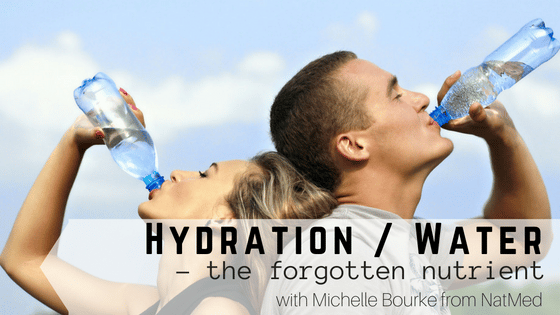
05 Aug Hydration/ Water – The Forgotten Nutrient
Why is it so important to stay hydrated?
Your body depends on water to survive. Every cell, tissue and organ in your body needs water to be able to function.
For example, your body uses water to maintain temperature, remove waste, produce hormones and lubricate joints.
Water accounts for up to 60% of the total body weight in a normal healthy adult, and the average infant approximately 75%.
It could be considered the most abundant constituent nutrient in the human body.
About 60% of the body’s water is contained within the cells as intracellular fluids, the other 40% makes up extracellular fluids, which include the interstitial fluid in tissue and the plasma in the blood.
You could survive for weeks without food but, without water, you would die in a matter of days. Nearly all the body’s chemical reactions occur in a watery medium. Water has many properties that make it such an indispensable compound for life.
Every day you lose between 1500 ml and 3000 ml of water from the kidneys as urine: from the skin as perspiration, from the lungs as you exhale, and from the gastrointestinal tract as stool. Serious dehydration can occur in an adult if there is a 10% net loss in total body fluid, and a 20% loss of fluid can be fatal. An infant suffers severe dehydration with a 5-10% loss in body fluid.
How does my body lose water?
Water makes up more than half of your body weight. You lose water each day when you go to the bathroom, sweat, and even when you breathe. You lose water more rapidly in extreme temperatures, when you are physically active, or if you have a fever. Vomiting and diarrhea can also lead to rapid water loss. If you don’t replace the water you lose, you can become dehydrated.
Water loss is continually replaced by the liquids and foods in the diet and, from metabolic processes that produce water in the cells of the body.
In 24 hours…
| Water Gain | Water loss |
| Liquid 1000ml Food 1200ml Metabolism 300ml Total 2500ml |
Urine 1500ml Perspiration 300mls Breath 600mls Feces 100mls Total 2500ml |
How do I know if I’m dehydrated?
Symptoms of dehydration include the following:
- Little or no urine, or urine that is darker than usual
- Dry mouth
- Sleepiness or fatigue
- Extreme thirst
- Headache
- Confusion
- Dizziness or lightheaded feeling
- No tears when crying
Who is at higher risk of dehydration?
People are at higher risk of dehydration if they exercise at a high intensity, have certain medical conditions, are sick, or are not able to get enough fluids during the day. Infants, children and the elderly are also at high risk..
You may need to increase the amount of water you are drinking if you:
- Have certain medical conditions, such as kidney stones or a bladder infection
- Are pregnant or breastfeeding
- Will be outside or during hot weather
- Are exercising
- Have a fever
- Have been vomiting or have diarrhea
- Are trying to lose weight
- Have a physical job
How much water should I drink each day?
You may have heard different recommendations for daily water intake. Most people have been told they should drink 6 to 8 glasses of water each day, which is a reasonable goal. However, different people need different amounts of water to stay hydrated. There are so many variables for an individuals water intake per day.
BIA – in clinic can measure intracellular and extracellular fluid balance. This can provide us with valuable information with how well your cells are functioning and your individual water requirements.
Tips for staying hydrated. . .
 ✓ Sip on small amounts of water throughout the day rather than taking big gulps as the body excretes any excess water it’s unable to absorb.
✓ Sip on small amounts of water throughout the day rather than taking big gulps as the body excretes any excess water it’s unable to absorb.
✓ Keep a glass jug or water bottle on your desk so you have water available to drink all day.
✓ Set yourself reminders on your phone every hour to drink
✓ Write yourself notes and pop them on your screen at work to remind you to drink water.
✓ If you don’t like the taste of plane water then jazz it up with any of these following combinations to add some flavour and additional nutrients,
✓ Raspberry & Mint, Orange & Cinnamon, Blueberry & Mint, Watermelon & Rosemary, Strawberry & Lemon, Mandarin & Cucumber, Lime & Strawberry
✓ Sip on water before, during, and after a workout.
When you’re feeling hungry, drink water. Thirst is often confused with hunger. True hunger won’t be satisfied by drinking water. Drinking water may also contribute to a healthy weight-loss plan.
Water can help maintain satiety : research suggests that drinking water can help you feel full.
If you have trouble remembering to drink water, drink on a schedule…
Try to drink water when you wake up; at breakfast, lunch, and dinner; and when you go to bed.
Or drink a small glass of water at the beginning of each hour.
And, when drinking alcohol, alternate a glass of wine with water, that way you’ll drink less alcohol and stay hydrated!

If you have some health goals in mind, or wish to check your current health and begin planning for how to improve it,
